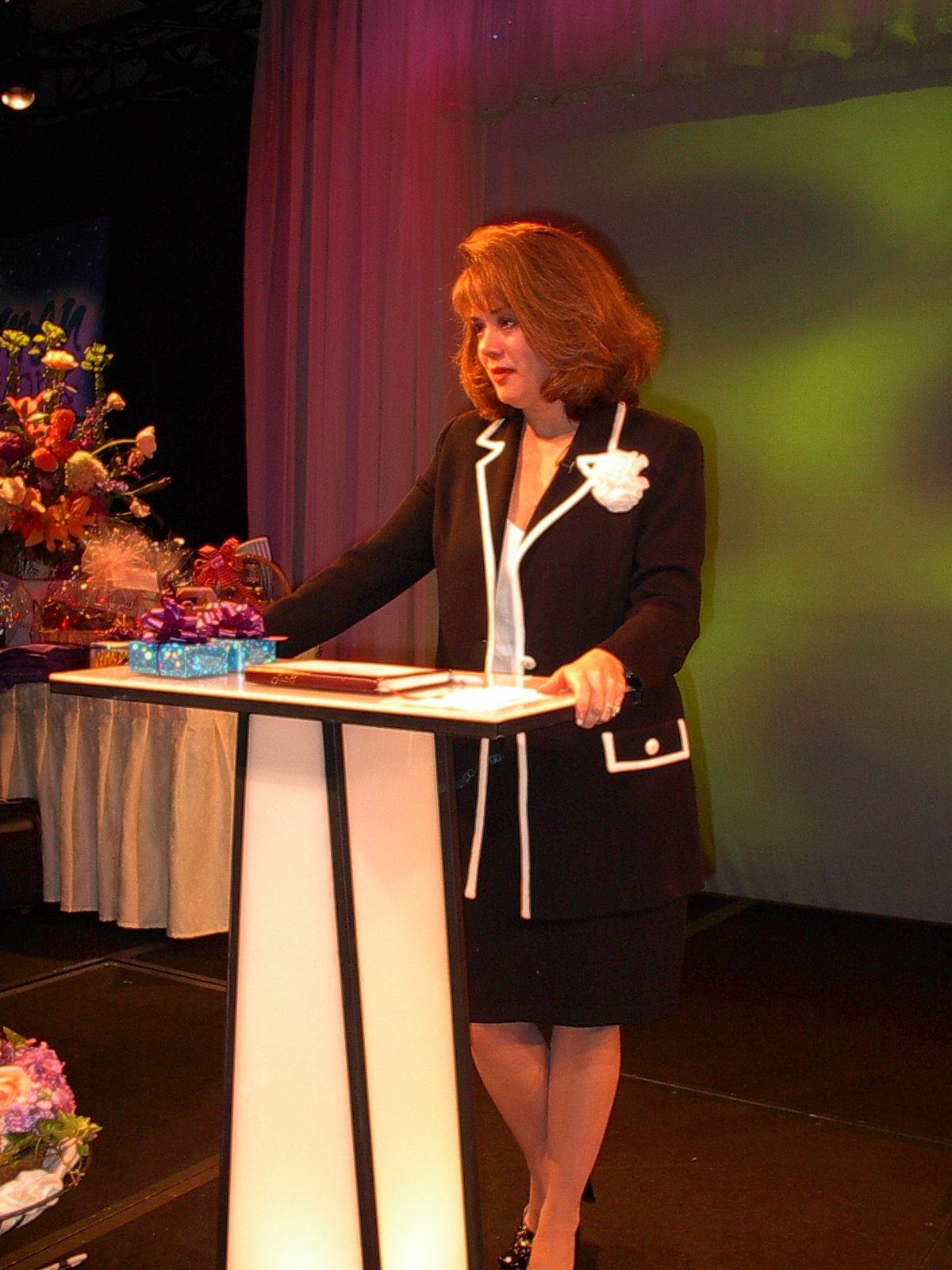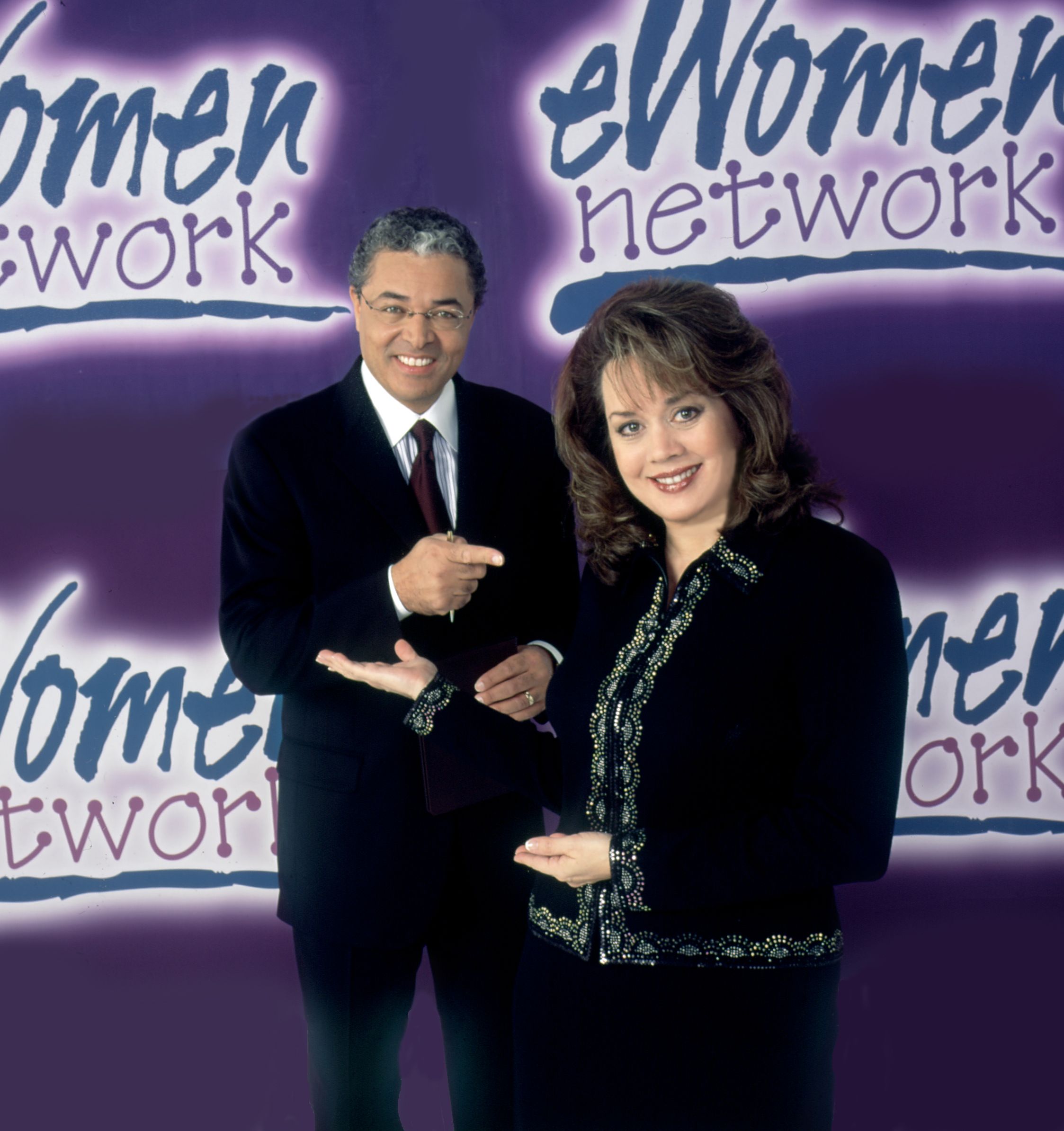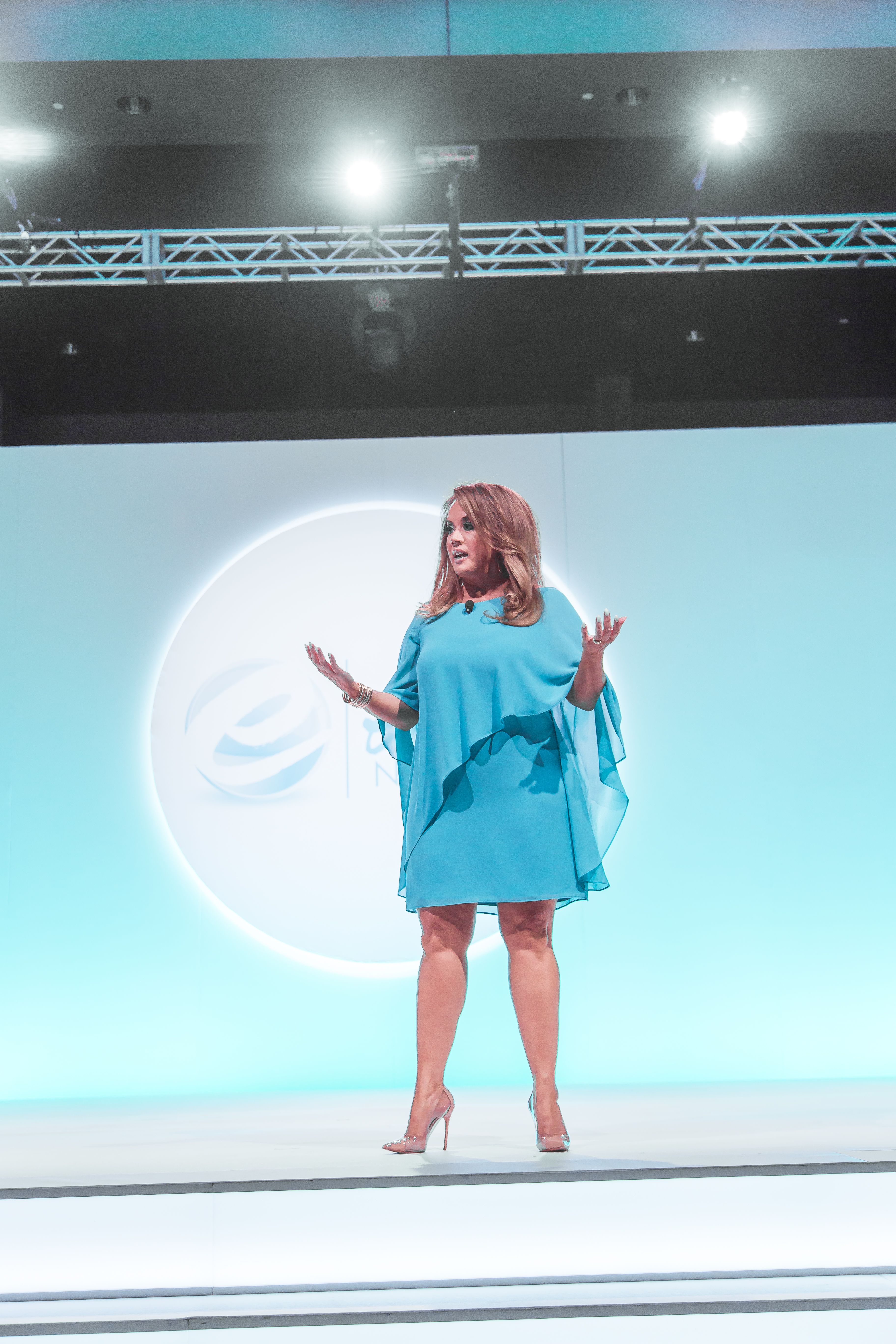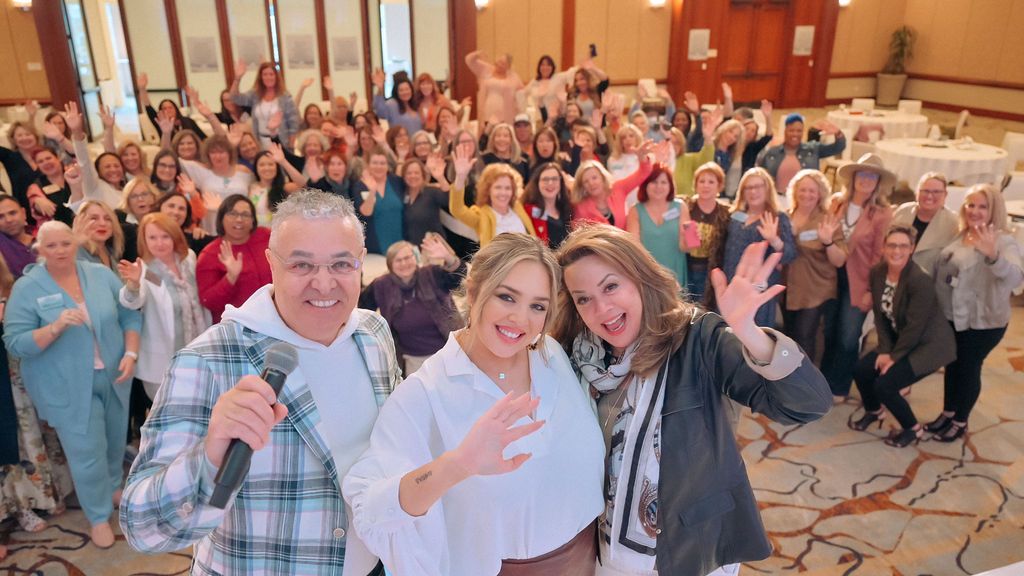N: Tell us about how the idea for eWomenNetwork came to be.
S: I moved from Dayton Ohio which I thought was “the Big D”. I just had no perspective. I mean honestly, I just could not believe the size of this city. I would go to networking events that were primarily men, and everyone was very kind to me, I had no issues with that. But I just didn’t feel like anybody was including me or inviting me to really play, I felt relegated. And so, then I started going to women’s organizations, this was 1999, and I just felt like, you know I had little kids too- I’m open to talking about kids and the ridiculous price of parking and the traffic or whatever, but I was like “when are we going to start talking about business?” and I can still remember being downtown and being at a table and trying to direct the conversation off of the small talk and into business and I really felt this energy of being put off like “who are you?”. I remember coming home and talking to Kym about it and he’s really the one who said “well, you should start your own”, you know just get real intentional about what you want, but it was really Kym’s idea, right there he saw it, I didn’t, I was too close to it.
And then I just started being the Managing Director, going out and doing meetings anywhere I could, I had a girlfriend who did my hair, Susie and asked her if I could use her hair studio in off hours. I called people, I went to Sam’s Club and bought little pieces of cheese and those God-awful toothpicks with cellophane at the end. And you know, Nicole, I saved and washed those toothpicks. I rolled in a little cooler of water bottles and schlepped a portable flip chart. We literally sat in those chairs that back into the bowls where they wash your hair.
In many ways it was way harder than I could have ever imagined and I’m glad I didn’t know. I think there’s something to be said for the bliss of ignorance. Because I do think, in total transparency, if I would’ve known everything that I was going to go through in those first four or five years, I think I would’ve chosen a different path.
N: When did you start to think bigger and act bigger as far as having eWomenNetwork be much bigger than Dallas, was this always the master plan?
S: I think we thought that it would have multiple chapters, I can’t say that I imagined it being the way it turned out, I mean multiple chapters could be in Dallas, that kind of thing. I didn’t have the ability to dream that big, you know, I wasn’t being coached in the very beginning. And I certainly didn’t have a pedigree to come from people who achieved great things. I mean, Kym saw it, from the perspective that he was a musician and had the experience of Capitol Records and that kind of thing, but even then, we both knew that that required infrastructure.
I think the interesting thing is that Kym was really the creative marketing guy and I’m really an operations person. Interestingly enough, that ended up being way more magical for the two of us than I think we ever could’ve imagined. Kym could think things up, but not really think about the implications of implementation. I had to take his ideas and say “How would we do this? How do we rinse and repeat and duplicate?” Then I realized that there’s a lot of creativity on the operations side of it, I just didn’t really know it.
I don’t think we had a full vision of it in the very beginning, by any means, but you know it was supposed to be E-womennetwork, it was all supposed to be electronic. It was intended to be the first Facebook for women entrepreneurs. And I learned a very important lesion about timing, you can have the best idea, but if it’s the wrong time it doesn’t matter, because back in those days everyone was still on dial up.
N: Back in those days, my Mom would buy things online and mail a check.
S: There was no such thing as Google. Actually, I think Google started in ’98.
N: They were Google, but they weren’t Google.
S: They weren’t a verb yet! You didn’t say, “go Google it”.
N: You always hear the stories about Microsoft going from a garage to an building, about Facebook going from a dorm to an office, when was that turning point when you went from a home operation to the operation you have now? How long did that take?
S: Believe it or not, just about three years. I mean we started moving very quickly when we saw what wasn’t working, and then we started saying “okay, so this isn’t going to be an online business”, I mean people were mailing us their photos and then we had to scan them. I mean, people didn’t have the ability to upload photos for their profile and that kind of thing.
I had all the apps filed in a box, in fact, I still have the box in my office as a memory.
Once we made the switch from the online idea to live events and created a system and a process for it, it grew really fast.
N: You talked about not being coached in the beginning, how far along was it in the eWomenNetwork journey that you sought out coaching?
S: I think about the third year. It wasn’t long after that that I started investing in coaching, not coaching programs, at the time they didn’t even exist back then, they were just one-on-one coaching appointments, like how you would see a therapist.
N: How long into your coaching was it before you saw a shift in the business, that next “level up”?
S: I saw it immediately. I saw the value of somebody just holding up the mirror and helping me hear myself out. I mean, advice is often that thing you seek, you already know the answer, you just can’t find it in all the confusion of everything else that you’re dealing with.
And you know, shortly after that is when we launched the Premier Success Coaches program that we have to this day. I mean this is life-changing and every entrepreneur needs to know this exists and that it’s available to them. Cut out the fancy coffee and the premium channels, I remember sitting down with Kym and saying we’re going to put a pause on this for three months. I look at 90 days as really 100 days, 100 days can make 100% difference in my business, how could I start to find the money? Because I wasn’t making it, I really just needed to find it in what I was already doing. We needed to eat smarter, do better planning, I needed to cook more instead of going out, I needed to learn to make smoothies instead of having an account at Smoothie King. At one point I was even trimming my own hair. I was the coupon cutting queen. You know, when you decide you want something, you just lose your excuses.
N: eWN is turning 22. When you look back on it, what are some of the benchmarks of the business you remember best?
S: I think we weren’t even three years old when we moved here on this floor, we’ve been here almost twenty years. So, coming here was a big deal, that was a big thing. I can still remember when we got an industrial coffee pot with the extra burner. That was a big deal for me. I remember when we got the big printer, remember our big goliath printer we had? That was a big deal to have a networked printer with the color and everything. I mean, back then that was a big deal. I remember when we got our name on the marquee outside, and I remember driving up Landmark Boulevard turning around, passing, coming back and just saying “that’s my little company!”, you know what I mean? I don’t think it’s the things that most people think, I mean I do remember the year we broke a million dollars, and the year we got almost a million dollars just with one sponsorship, $785K just with one corporate sponsorship in one year. I mean, I remember all those, but they don’t land as significant as some of these things that seemed more every day operational.
N: You’ve talked a lot about the importance of multiple revenue streams, when did you guys add the branding agency side of the business to the mix?
S: Ten years in. We had a whole decade of perfecting the chapter part of the business, you know, just drilling, drilling, drilling until you strike oil kind of thing. And really get a cash cow going to be honest, because anything else that you launch is going to take time, energy, and resources. That was some advice I got early on in my coaching.
N: When you think of those first few years, what were a few of the things you are glad you did and a couple of the things you wish you’d done differently?
S: Some of the things I’m glad I did, I’m glad we invested in the technology infrastructure, even though we’re on our fourth or fifth rendition of it, but you know nothing when it comes to technology is ever going to last forever. I guess I look at phones and I always say to Kym, “at least we don’t have eleven websites”, you know? But, yes, I’m really glad we went ahead and invested in that technology. That has been instrumental, it’s not without its headaches, but it’s been instrumental.
I’m really glad that we built a team. I mean, I was scared, I’d never employed anyone before. It was scary for me, but I’m glad we did that because that began to shift the business as well. And it became fun to me. I’ve loved our team, we’ve had a few unfortunates, but that teaming thing, we’ve mostly done it right. Most people want to stay, but even if they leave they want to stay connected.
N: Plus, it’s just nice to like the people you work with. There is something to be said for connecting with energy.
S: You know what, who’s got time for being with people you don’t like? Life’s way too short and we spend too much time together.
I think the other thing we’ve done well is stay continuous learners, you know, what else is out there? Like Briana, it’s lucky for me, I’ve got somebody now who can go out there and she’s going to a conference in June to see what’s going on. How can we adapt in our environment? I like to find things that aren’t happening in our space that are being done in a different industry.
N: Plus, as soon as you think you know everything, you’ve cut yourself off at the knees.
S: Amen, sister.
Now, what haven’t we done well? Well, I’ve done my fair share of abdicating and not delegating. I had a person that stole from us, a significant amount of money, and I was willing to walk away from it, but Kym felt so personally violated that she ended up having to pay restitution. But yes, the abdicating versus delegating has bitten me in the behind several times that’s a Michael Gerber term.
I think I’ve held on to some relationships too long because I value loyalty. And it’s been a hard lesson for me, it took a coach to say to me “you’re making this change, you’re making it at 4 o’clock, and you’re calling me at 4:30 to tell me how it went.”
I struggled with a person who I cared about immensely. She’d been with me for a really long time, but she just didn’t want to learn anymore, and that job needed to shift, it needed to automate. I probably held on longer than I should. I think it created frustration with other team members and my lesson was that the best way to harm a good employee is to tolerate a bad one.
N: If you could go back in that first year of business and give yourself one piece of advice, what would it be?
S: Develop a relationship with a banker from the get-go. I didn’t understand that banks only want to loan you money when you don’t need it. It was a foreign concept, I didn’t know. There’s just so much you don’t know when you’re first starting out. They don’t want to loan you money when you need it, so Kym and I spent every dime we made and most of what we had saved getting this business off the ground and we thought we were doing it with great pride and conviction to our dream, and then when funds started running low and we needed money to do some things to expand, we were really tight. I went to the bank, and I told them all I’d done and how much sweat equity I put in, how much of my own money I put in, and they were like “we don’t want to loan it to you”. If I’d done it in the very beginning and built really good business credit it wouldn’t have been as hard. Kym and I had to think about how we were going to fix that, and how we did it was really going after corporate sponsorships. That’s how we overcame it, but then I smartened up.
But women don’t have access to those lessons, you know? Which is why it’s behooved me to invest in some of the bigger coaches I’ve worked with. All their years’ experience got compressed into some really simple concepts for me that I was able to accelerate my growth on, and I think women that just don’t value or don’t want to put the money aside for coaching will never get.
I still believe the whole lift as you climb concept was really built on my mother saying, “give without remembering and take without forgetting”, you know? Don’t just help people because you need or want something from them, help people who can never pay you back. Help people because you can. You put all this wonderful energy into the world, and you know, your time will come. Suddenly, the right person shows up in your life and it’s just proven to be true over and over and over again. And that’s really what a network is all about.









Leave a comment
You must be logged in to post a comment.